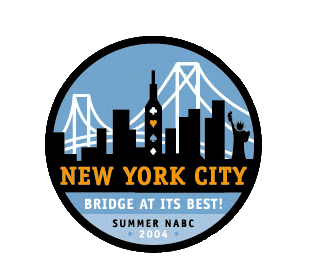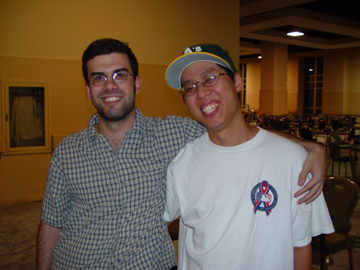
Bridge At Its Best ....
|
Page 1 |
Goodwill (cont'd) As she accepted her award, Joan offered this tidbit. “Alan Truscott wrote about my marriage to Ron Gerard, saying that a bridge player married a bridge administrator. My question for Alan was which is which?” Leonard Harmon Stakgold also told how Lennie helped Edgar Kaplan and Freddy Sheinwold to perfect the Kaplan-Sheinwold bidding system. “It was such a good feeling when we won the Vanderbilt in 1958, defeating Edgar and Freddy in the final. Bill Eisenberg, who was a regular partner of Harmon’s until he joined the Aces, was present also but did not speak because of time pressures. Alan Truscott Alan has been a major force in New York bridge over the years, but not just because of his position as bridge editor of the New York Times. He has worked hard for the New York unit, come up with great ideas like the Battle of the Sexes, and conceived and worked up many other promotions. Phillip told about Alan’s adjectival bidding system. “You are allowed one adjective with each bid. So you could open with one marginal 1H and hear an opponent overcall one strong S. Sounds interesting.
Seth Manfield, 13, and Sabrina Manfield, 12, entered the Stratified 299er Swiss Teams on Sunday with about three masterpoints each. They doubled their holding when they and teammates Doug Fields and Judah Kaplan entered in the 99er strat and emerged as the winners of all three strats. If Seth and Sabrina’s surname sounds familiar, it should. They are the children of Ed Manfield, who had a distinguished bridge career before his death in 2000. The youngsters live in Chevy Chase MD, and in fact were planning to depart New York on Monday to attend chess camp. |
It's a jungle (cont'd) Says Soloway: “It’s tougher to win the Spingold than the Bermuda Bowl.” A major factor in the change, most observers agree, is the influx of top players from overseas. Stars from around the world are regular attendees at the NABCs. Among them are the members of the very strong team from Italy that nearly won the Bermuda Bowl last fall in Monte Carlo. There are also top players from Europe, Australia and the Far East. Most NABCs, says Soloway, will feature 75 to 80 of the top 100 players in the world. The winning Spingold team last year, in fact, included two Polish stars: Cezary Balicki and Adam Zmudzinski. In the amazing run of the Nickell team from 1993 through 1999 – the team won six of seven Spingolds in that period – their only loss came at the hands of a squad captained by Grant Baze that included Balicki, Zmudzinski and two other Polish players. But, says Soloway, it’s not just the tough “It used to be if you bid well and took your tricks you could win every match,” says Soloway. “Now everyone bids well and the systems are good.” “The fields are deeper now,” says Chip Martel, who won the 2001 Bermuda Bowl playing on the Rose Meltzer team. “The rounds of 64 and 32 (in the Spingold and Vanderbilt) used to be pretty routine, but now there are many days when more than one top team is upset.” Says Bobby Wolff, an 11-time world champion: “The Spingold and the Vanderbilt have both gotten a lot tougher. The average-plus players now can beat you because they don’t beat themselves as much as they used to.” By the round of 16, Soloway says, “there are no weak teams.” He notes that in the round of 16 in the Vanderbilt this spring in Reno, the Nickell team found themselves facing a squad that included Claudio Nunes and Fulvio Fantoni, reigning World Open Pairs champions – and a Swedish star as well. The Nickell team won, but Soloway notes that the top foreign players can be very difficult to play against. Nunes and Fantoni, for example, have defensive carding agreements that make them extremely tough opponents. Advances in bidding, Soloway notes, have helped many players elevate their games. “When I started there weren’t even splinter bids,” Soloway says. | He recalls a team trials in San Francisco in 1965 in which half the field bid a grand slam missing five trumps to the king-jack. He remembers that Eddie Kantar and Marshall Miles had a special convention – a leap to 5C – that helped them stay out of slam. Soloway’s regular partner these days is Bob Hamman, the world’s No. 1-ranked bridge player since 1985. Soloway acknowledges that while he and Hamman are better players than they were a few years ago, they now have to pace themselves as age becomes more of a factor (both players are in their 60s).“We have to slow down and work harder,” says Soloway. While it may be tougher to win the coveted titles, Soloway says, he doesn’t regret it. In fact, Soloway likes the change: “It’s exciting to play all these good teams.”
Josh Donn and Joon Pahk were winners of the
Stratified Junior Scholarship Pairs Sunday
evening. They each receive $500 scholarships
as winners of Strat A. The Strat B winners,
Gregory Ingolia and Jason Chiu of of
Cambridge MA, receive $375 each. Pahk is a
student at Stanford University. Donn just
graduated from Rochester University in New
York and plans to move to Los Angeles. They
had played only once previously in person,
although they do have experience as online
partners. They play a strong club system with
relays.
New Life Masters Douglas Hamilton of Halifax NS needed 6 gold points for his gold card, and he got 14 in the Bracketed Knockouts. He was playing with his wife Carol, and their teammates were Kathie MacNab and Bill Halliday, also of Halifax. Paula Cohen of Basking Ridge NJ needed 5.28 points and collected 8.16 in a Bracketed Knockout event to earn her gold card. Her partner was Barbara Lowenfish of Livingston NJ and her teammates were Ellen Dutcher of Denville NJ and Ed Finlay of Southbury CT. Rozi Alhale lost in the semifinal of the Friday- Saturday Bracketed Knockout Teams, but she won enough points to earn her gold card. She played with her husband Jack. Clark Fairbrother went over the top in the Sunday afternoon side game.  |

